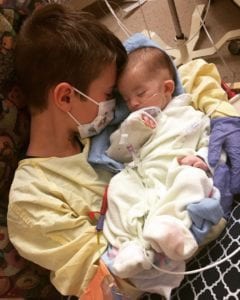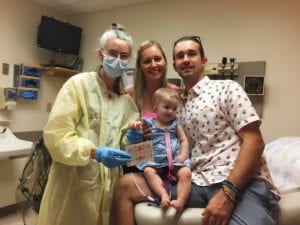Every ultrasound Maggie had showed that her daughter, Aunika, was perfectly fine.
The family was left in shock when she was born struggling to breathe. Baby Aunika was rushed to the NICU. In addition to respiratory issues, one ear was smaller than the other (microtia) and when Maggie tried to nurse her, the milk aspirated into her lungs. No one knew what was wrong. Aunika was given a feeding tube and kept in hospital.
The results of her Ontario Newborn Screening test came back a couple weeks later, and led to another shock. Aunika didn’t have an immune system.
Without one, any bacterial or viral infection could be deadly. Aunika was immediately moved to a single room and precautions were put in place to limit her exposure to pathogens. Visitors donned masks before coming in the room.

She underwent a slew of genetic testing in hopes of identifying the cause of her immunodeficiency, but nothing was found. Her condition was a mystery.
“They didn’t know how to help us. We were told she probably wouldn’t see her first birthday and that we should enjoy quality time with her. We were terrified. I remember living in constant fear. My stomach hurt all the time.” – Maggie
Maggie and her husband spent countless hours in the hospital by their daughter’s side. Maggie was still recovering from her C-section and pumping breast milk for Aunika’s feeding tube. They constantly needed to suction her airways to keep them clear. They tried to wrap their minds around the fact that they didn’t have answers.
“I was shocked. I thought there is no way, in this day and age, that you haven’t seen someone like my daughter before.”-Maggie
The family was told they could try elsewhere to find answers, but their physician had already reached out to other immunologists who also drew a blank. He wasn’t sure where else to refer them.
Maggie began doing her own research, googling her daughter’s symptoms, following any leads that seemed to align. She found a researcher at Duke, Dr. Louise Markert, who was leading an investigational treatment in babies with congenital athymia- infants born without a thymus. The description of the babies sounded a lot like her own daughter. Maggie had never heard of the thymus; she wasn’t sure what it was at first, but she felt she may have finally found an answer and she felt she had nothing to lose.
She called the researcher and left a voicemail. She was amazed when her call was returned the same day, by the researcher herself.
After a heartfelt conversation, Dr. Market agreed that Maggie’s daughter may be one of her patients.
There are varying types of disorders that can result in aythmia, including DiGeorge and CHARGE Syndrome, but Aunika was lacking the typical genetic components. Dr. Market requested specific tests be done at Sick Kids Toronto Hospital, and asked for results and previous records to be sent to Duke. Once the additional date was reviewed, the researchers at Duke were almost certain Aunika had congenital athymia and began working with the family to be able to see her in person and coordinate treatment.
Aunika’s original doctor was skeptical. He didn’t think that the investigational treatment- a thymus transplant- would work, and was instead in favor of a bone marrow transplant. Maggie, however, was convinced the thymus transplant was the right choice. Everything she had read about patients with athymia and Duke’s research had resonated with her. The immunologist wrote them a letter of support, despite his doubts, because any treatment held more hope than none for baby Aunika.
The family moved forward to petition the Canadian government to cover the procedure – the committee agreed in record time. As luck would have it, there was a spot available in the study, and things were set in motion. The family packed up and began the 14 hour drive to North Carolina, where they would live for the next eight weeks.
Little Aunika was only 9 months old but she was still past the age the researchers find ideal for a thymus transplant. Babies with congenital athymia should have the procedure done prior to three months of age when they tend to be stronger, because they’ve had less time to be exposed to various bacteria and viruses. Many children aren’t identified that early because the condition is rare and physicians aren’t familiar with it. Some children, vulnerable and unable to fight infections, sadly don’t live long enough to for doctors to figure out why they are immune deficient.
As soon as the newborn screening tests had shown showed Aunika was lacking an immune system, her family had committed themselves to being extremely vigilant in their precautions. They wiped everything down constantly. The whole family would shower, change, and use disinfectant every time they re-entered the house. As cautious as they were, Aunika still had more than one infection. Each was taken extremely seriously and treated right away, and luckily, Aunika pulled through.
Once the family arrived at Duke, they had to wait for an adequate thymus, with no sign of infection, to become available for Aunika. The thymus tissue comes from living donors-specifically other babies who undergo heart surgery. The thymus gland in babies is in the way of the cardiac surgeons’ access to the heart so they must remove part of it. This tissue would normally be discarded. Duke asked the parents of these babies for their permission for the tissue to be kept and tested for transplantation.
Aunika waited as 1, 2, 3, 4, 5, 6, parents consented and tissues were tested only to be found they could not be used.

On the 7th day of the 7th month of 2017, Aunika received the 7th donated thymus. Aunika was the 92nd person in the world to undergo a thymus transplant.
Maggie was overcome with gratitude that seven other mothers were selfless enough to undergo bloodwork and sign consent forms in the midst of dealing with their own children’s surgeries. Recipient families can’t be told who donors are or have direct contact, but Maggie was able to write the donor’s family an anonymous thank you card.
The transplant was a success. Aunika’s original immunologist apologized for his skepticism regarding the course of treatment they had chosen, referring to Aunika as a “little princess trailblazer”, and expecting, one day, to perform the procedure himself.


